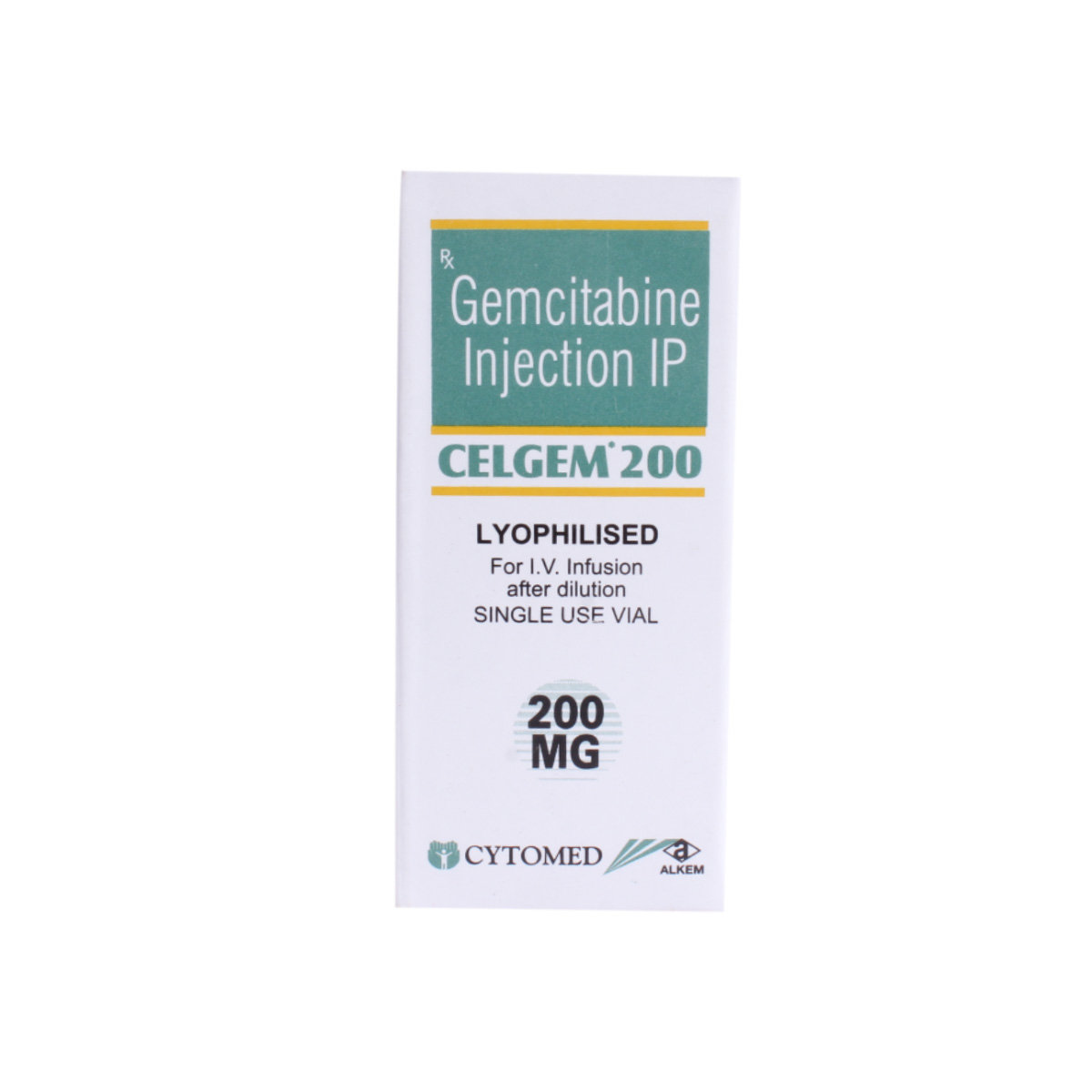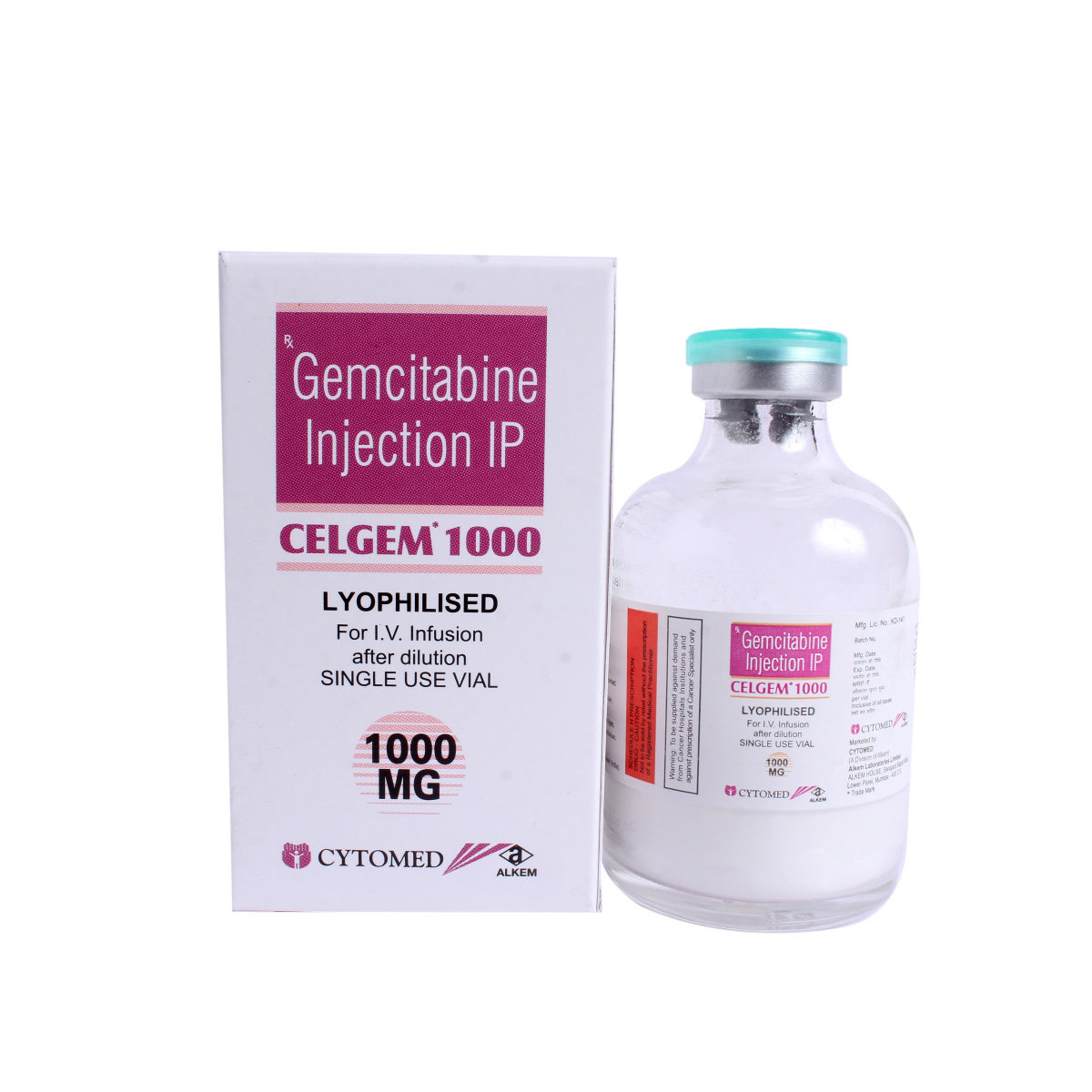Gemcitabine
About Gemcitabine
Gemcitabine belongs to the group of anti-cancer drugs called cytotoxics used alone or in combination with other anti-cancer drugs to treat various types of cancers like breast cancer, pancreatic cancer, non-small cell lung cancer, bladder cancer, and ovarian cancer. Cancer is the uninhibited and uncontrolled growth of cells in the body.
Gemcitabine contains Gemcitabine which works by interfering with the synthesis of DNA, thereby causing cell death and arresting the uncontrolled production of new cells. Thus, Gemcitabine is very effective in controlling cancer cells from multiplying and is used in the treatment of various types of cancers.
A healthcare professional will administer Gemcitabine. Do not self-administer. Gemcitabine may cause certain common side effects such as nausea, hair loss, skin rash, vomiting, and oedema. Most of these side effects do not require medical attention and will resolve gradually over time. However, you are advised to talk to your doctor if these side effects persist.
It is advisable to inform the doctor if you are allergic to any of the components. Consult your doctor if you are pregnant, planning to get pregnant, or breastfeeding. Talk to your doctor if you are planning to father a child before taking Gemcitabine; your doctor may advise you regarding sperm storage. Avoid taking alcohol with Gemcitabine.
Uses of Gemcitabine
Medicinal Benefits
Gemcitabine is an anti-cancer drug used in the treatment of various types of cancers. Gemcitabine is used either independently or in conjunction with other chemotherapy medications to treat breast cancer, pancreatic cancer, non-small cell lung cancer, bladder cancer, and ovarian cancer. Gemcitabine works by interfering with DNA synthesis. It blocks the production of new DNA, by locking itself into the DNA strands and inhibiting any further proliferation or growth of the cell. Hence, Gemcitabine has widespread application in the field of oncology (cancer-related medicine) and chemotherapy.
Directions for Use
- Your doctor will decide the dosage and timing of Gemcitabine based on the type of cancer and your body's response to the treatment.
- Gemcitabine will be administered by the doctor or nurse in a medical setting.
- Do not self-administer it.
Storage
Side Effects of Gemcitabine
- Nausea
- Vomiting
- Hair loss
- Flu-like symptoms such as high temperature, chills
- Swelling of ankles, fingers, toes, feet
- Low blood levels (anaemia)
- Shortness of breath
Drug Warnings
Gemcitabine should not be used in case of any known allergy to any of the components. Gemcitabine should be used with caution in case of high risk or previous history of heart disease, vascular disease, liver problems, kidney disease or alcoholism. Keep your doctor informed if you suffer from any shortness of breath, kidney problems, hypertension diabetes or epilepsy. Avoid Gemcitabine during pregnancy and breastfeeding. Offer a detailed medical history, vaccination history, and inform the doctor especially if you are on any radiotherapy.
Drug Interactions
Drug-Drug Interactions: Gemcitabine may interact with analgesic (acetaminophen, aceclofenac), diuretic (acetazolamide), antiviral/anti-HIV drug (abacavir), anti-rheumatoid drug (abatacept), or any anticoagulants (acenocoumarol).
Drug-Food Interactions: Gemcitabine may interact with ethanol.
Drug-Disease Interactions: Gemcitabine should be used with caution in patients with a known hypersensitivity disorder, epilepsy, kidney disease, liver disease, lung or breathing disorders and insomnia.
Drug-Drug Interactions Checker List:
Safety Advice

Alcohol
unsafeIt is not recommended to use alcohol with Gemcitabine as it might lead to increased drowsiness.

Pregnancy
unsafeGemcitabine should be avoided during pregnancy. Please consult your doctor if you have any concerns.

Breast Feeding
unsafeGemcitabine is not recommended during breastfeeding. Please consult your doctor in case of any concerns.

Driving
cautionGemcitabine may cause drowsiness and sleepiness, which may affect your ability to drive. Do not drive if you experience any side effects after using Gemcitabine.

Liver
cautionExercise caution before using Gemcitabine in case of established liver disease. Please consult your doctor to address any concerns.

Kidney
cautionExercise caution before using Gemcitabine in case of established kidney disease. Please consult your doctor to address any concerns.

Children
unsafeGemcitabine is not recommended for use in children under 18 years of age. Please consult your doctor in case of any concerns.
Habit Forming
Diet & Lifestyle Advise
- Cancer can take a toll on anyone. Make sure you regularly see a therapist and take care of your mental health.
- Meditation and yoga have also proven very effective in helping cancer patients maintain a healthy attitude and body.
- Eat more lean meats, healthy fats, fruits, vegetables and whole-grain foods to give you more energy.
- Avoid taking Gemcitabine with alcohol as there may be an interaction.
- Stay hydrated by drinking plenty of water, as dehydration is often seen in cancers.
- Taking a stroll in the garden or spending 30 minutes of your time doing some light physical activity can be very useful. However, do not over-exert yourself if you feel too tired.
- Avoid tobacco use.
Special Advise
- Discuss contraception with your doctor while taking Gemcitabine.
- Men are advised not to father a child during and up to 6 months of treatment with Gemcitabine. In case of any concerns, please discuss them with your treating doctor.
- You may want to consider sperm storage before starting Gemcitabine. Seek counsel on the same from a qualified healthcare individual and/or sperm bank.
- In case of any flu-like symptoms such as fever or chills, please consult your doctor before taking any antipyretic medications or paracetamol.
Patients Concern
Disease/Condition Glossary
Cancer: Cancer is a disorder in which some of the cells of the body grow at an abnormal rate and spread to other parts of the body they are not originally meant to be in. Cancer is acknowledged as a genetic disease. It is most probably inherited from either parent or a blood relative. Extreme weight loss, loss of appetite, extreme lethargy, anaemia (low blood levels) and giddiness are some of the common symptoms of cancer.
FAQs
Gemcitabine belongs to the group of anti-cancer drugs called cytotoxics used alone or in combination with other anti-cancer drugs to treat various types of cancers like breast cancer, pancreatic cancer, non-small cell lung cancer, bladder cancer, and ovarian cancer.
Gemcitabine works blocking DNA synthesis and causing cell death, thereby preventing the cells from proliferating beyond normal.
Men taking Gemcitabine are advised not to father a child during the treatment with Gemcitabine and for 6months after the treatment. Consult your doctor before starting Gemcitabine if you are planning to father a child. Your doctor may advise you regarding sperm storage.
If you suffer from CKD, please consult with your doctor before using Gemcitabine and discuss any concerns with them. Gemcitabine is to be used with caution in those suffering from kidney and liver problems.
Gemcitabine might cause low white blood cell count leading to increased risk of infections. Consult your doctor if you have a fever, sweating, and any signs of infections.
Gemcitabine may cause bleeding and bruising due to less platelet count. Consult a doctor if you notice unexpected bruising, pinkish or reddish urine, bleeding from gums, mouth, or nose.
Gemcitabine contains Gemcitabine which works by interfering with the synthesis of DNA, thereby causing cell death and arresting the uncontrolled production of new cells. It is very effective in controlling cancer cells from multiplying and is used for the treatment of various types of cancers.
The side effects of Gemcitabine include hair loss, vomiting, nausea, skin rash and oedema. Consult the doctor if any of these symptoms persist or worsen.




